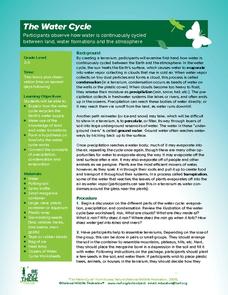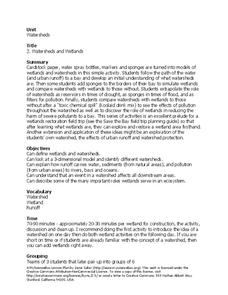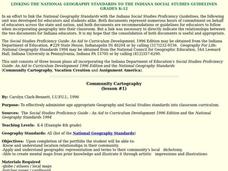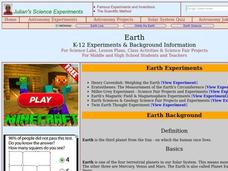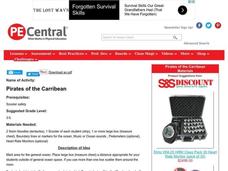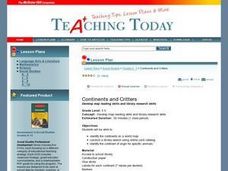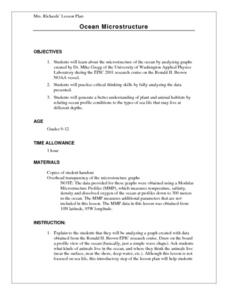Curated OER
The Water Cycle
Students are introduced to the components and importance of the water cycle. They are shown how groundwater moves using a model. Students list 9 places on earth where water is found. They define the terms cycle and water cycle.
Alabama Learning Exchange
Coral Reefs
Study explore coral reefs. In this coral reef instructional activity, 4th graders examine the physical structure of coral reefs. Students consider why coral reefs need to be protected and ways to protect them.
Curated OER
The Mesozoic Era
Sixth graders recognize that the Earth was different in different eras. In this Mesozoic Era lesson, 6th graders compare the time frame of the different eras and how long they lasted for by graphing them. Students study the...
Curated OER
Oceanic Habitat Zones
Students explore ocean habitats. In this oceanic environment lesson, students research various habitats in the ocean. Then, in a jigsaw format, students teach others in the class about the habitat they researched.
Curated OER
Tsunami
Students examine what causes tsunamis and why they all behave differently. For this tsunami lesson students complete a group activity after viewing a video.
Curated OER
Plate Tectonics
Learners identify that most of mountain ranges found on all major land masses and in the oceans are external reflections of tectonic movements within the earth. They identify that earthquakes and related phenomena are caused by the...
Curated OER
The Paleozoic Era
Students access prior knowledge to create a chart of eras. In this Paleozoic era lesson, students research the Paleozoic era to find information to create dioramas. Students participate in fossil activities.
Curated OER
Where in the world is...
Students identify locations around the world. In this mapping lesson, students place tag board pieces with names of locations on a wall map of the world. Initially, students identify states, then cities, then continents,...
Curated OER
Ocean Power
Students explore the energy resources of the ocean. In this energy lesson, students participate in 4 activities focused on energy resources from the ocean.
Curated OER
Volcanoes!
Students define what a volcano is. They discover where and why volcanoes occur. They study effects of volcanoes on the Earth system.
Curated OER
Let's Play Geography Twister
Pupils practice geography skills by playing a game based on Twister. Students manipulate their position on a map by placing their arms and legs on the appropriate state or country called out by the teacher.
Curated OER
Watersheds and Wetlands
Students simulate a chemical spill. In this watersheds and wetlands lesson plan, students build a watershed and observe what happens when it rains. Students add wetlands to their watershed models and examine the effects of water pollution.
Curated OER
Earth and Space Science: Exploring Earthquakes
Students explore earthquakes. In this earthquake lesson, students research earthquakes and identify where they take place. Students use map skills to track down earthquake locations. There are internet sites suggested in this lesson.
Curated OER
Oh No! Oil Spills
Students discover the threats of an oil spill. In this ecological awareness lesson, students examine the effects of oil spills on animals and our oceans. Students get simulated oil on themselves and discover ways to clean it up.
Curated OER
GENEROSITY
Students assess the impact that each one of us has on the other, that we all have something important to give and how when we give our offerings out how they make a difference in other people's lives as well as the difference they make...
Curated OER
Community Cartography
Learners use an inflatable globe which they wrap in plastic wrap. They use a permanent marker and outline the continents, and label major oceans and trace the equator. Students bring heir globes and use their projection for a discussion...
Curated OER
Earth
Young scholars study the earth in relation to the solar system. In this planetary lesson students complete several investigations into the measurement of the earth and its magnetic field.
Curated OER
How Islands Form
Pupils how islands form, rising water levels, growth of coral, and volcanoes. They complete Island Investigation worksheets after researching island formation on various Internet websites.
Curated OER
Pirates of the Carribean
Learners (pirates) sit on a scooter (pirate ship). Two students are called 'Crackens' sit on their own ships. Crackens use a swim noodle (tentacle) to gently tag the pirates. Learners began the game with the ROAR of the Cracken and they...
Curated OER
Pirates of the Caribbean
Students participate in a "Pirates of the Caribbean" tag game to demonstrate scooter skills and safety techniques. Students identify and discuss scooter safety rules, then play a tag game with each student (pirate) on a scooter, with...
Curated OER
Continents and Critters
Students investigate and identify the continents of the world. They identify and locate the seven continents on a map, and label a coloring page of a world map. Students then conduct research on an assigned continent, and write and...
Curated OER
Mapping The Ocean Floor
Young scholars explore and analyze the bottom structure of underwater habitats. They describe and explain what can't see through the collection and correlation of accurate data. Learners assess that technology is utilized as a tool for...
Curated OER
Ocean Microstructure
Students assess the ocean's microstructure by analyzing graphs created during tne Ronald H.Brown research cruise. they discuss at what depths various sea animals live and write paragraphs on data analysis from the graphs.
Curated OER
The Splendor of Canada's Provinces and Territories
Sixth graders use a map of Canada to label all provinces and territories as well as write information about each location. Using books, they read about each province and territory and write down adjectives describing them. They paint a...
